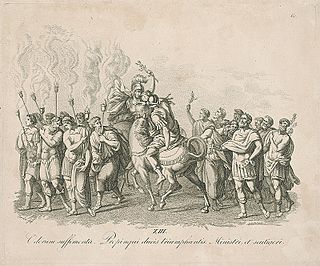Related Research Articles
Lucius Trebius Germanus was a governor of Roman Britain in 127, and suffect consul with Gaius Calpurnius Flaccus, the proconsul of Cyprus in 123, at an uncertain date. He is known from a military diploma published in 1997 that bears the date 20 August 127.

Publius Mummius Sisenna was a Roman politician who was consul ordinarius in 133 with Marcus Antonius Hiberus as his colleague, and governor of Roman Britain shortly afterwards. Hadrian's Wall may have been finished under his governorship.
Lucius Antistius Rusticus was a Roman senator active in the later part of the first century AD. He was suffect consul for March to April 90, with Lucius Julius Ursus Servianus as his colleague.
Tiberius Julius Candidus Marius Celsus was a Roman senator who lived during the Flavian dynasty. Contemporary sources, such as the Fasti Ostienses, the Acta Arvalia and a letter of Pliny the Younger, refer to him as Tiberius Julius Candidus. He was twice consul.
Lucius Venuleius Montanus Apronianus was a Roman senator of the first century. He was suffect consul for the nundinium of January to April AD 92 with Qunintus Volusius Saturninus, replacing the emperor Domitian.
Titus Salvius Rufinus Minicius Opimianus was a Roman senator of the second century. He is known to have served as suffect consul in 123 with Gnaeus Sentius Aburnianus as his colleague. He is also attested as proconsul of Africa in 138/139.
Gaius Curtius Justus was a Roman senator who held several posts in the emperor's service during the Antonine dynasty. He was suffect consul in 150 with Gaius Julius Julianus as his colleague. Justus is known primarily through surviving inscriptions, although he could be identical with the Curtius Justus mentioned as a scriptor rei rusticae by Gargilius Martialis (2.1.4,7).
Galeo Tettienus Severus Marcus Eppuleius Proculus Tiberius Caepio Hispo was a Roman senator active in the late 1st and early 2nd centuries AD, who occupied a number of offices in the imperial service. He was suffect consul around the year 101 as the colleague of Rubrius Gallus.
Gaius Cilnius Proculus was a Roman senator active during the reign of Domitian. He was suffect consul for the nundinium September–December AD 87 with Lucius Neratius Priscus as his colleague. It is unknown how or if Proculus is related to the better-known Gaius Cilnius Maecenas. Proculus is known only through surviving inscriptions.

Quintus Pomponius Rufus was a Roman senator active in the imperial service; he was governor during the reigns of the emperors Domitian and Trajan. Rufus was also suffect consul for the nundinium September-December AD 95 as the colleague of Lucius Baebius Tullus. Pomponius Rufus is known primarily from inscriptions.
Aulus Marius Celsus was a Roman senator who held several offices in the emperor's service during the first century AD, as well as playing a role in the Year of Four Emperors. He was suffect consul of the nundinium of July to August 69 as the colleague of Gnaeus Arrius Antoninus.

Lucius Valerius Propinquus was a Roman senator active in the second century AD. He was suffect consul who replaced the ordinary consul Marcus Annius Verus and was the colleague of the other ordinary consul, Gaius Eggius Ambibulus, for the remainder of the first nundinium of 126.
Aulus Ducenius Geminus was a Roman senator active in the first century AD. Geminus is best known as Galba's appointment as Urban prefect of Rome during the Year of Four Emperors.
Gaius Valerius Severus was a Roman senator of the second century. He was suffect consul in the nundinium of September to December 124 as the colleague of Gaius Julius Gallus. Severus is primarily known from inscriptions.
Senecio Memmius Afer was a Roman senator active in the last quarter of the first century AD. He was suffect consul for the nundinium of June to July AD 99 as the colleague of Publius Sulpicius Lucretius Barba. Afer is known primarily from inscriptions.
Aulus Vicirius Proculus was a Roman senator active during the last half of the first century AD. He was suffect consul for the nundinium September to December 89 with Manius Laberius Maximus as his colleague. Proculus is known only through surviving inscriptions.
Tiberius Julius Candidus Celsus was a Roman senator, who was active during the reign of the emperors Hadrian and Antoninus Pius. Coins of the town of Harpasa bear the image of the young Marcus Aurelius on the obverse, and the name "Candidus Celsus" on the reverse, attesting that Celsus was proconsular governor of the public province of Asia in the reign of Marcus. Ronald Syme dated his tenure as governor more narrowly to AD 144/145, which would date his suffect consulate to a nundinium around the year 129.
Pompeius Paullinus was a Roman senator, who was active during the reigns of Claudius and Nero. He was suffect consul during a nundinium in either the year 53 or 54. According to Pliny the Elder, Paullinus was the son of Pompeius Paulinus, an eques from Arelate. He may have been the brother of Pompeia Paulina who was the wife of the philosopher and statesman Seneca.
Marcus Aefulanus was a Roman senator, who was active during the reigns of Claudius and Nero. He was suffect consul in the second half of 54. He is known to have held one other office, proconsular governor of the public province of Asia around 66/67. Aefulanus is only known from inscriptions.
References
- ↑ John D. Grainger, Nerva and the Roman Succession Crisis of AD 96-99 (London: Routledge: 2004), p. 14
- ↑ Syme, "Missing Persons II", Historia: Zeitschrift für Alte Geschichte , 8 (1959), p. 210
- ↑ Vincenzo Saladino, "Iscrizioni Latine di Roselle (II)", Zeitschrift für Papyrologie und Epigraphik , 39 (1980), pp. 229-232
- ↑ Merkelbach, "Ephesische Parerga (1): Der Proconsul A. Vicirius Martialis", Zeitschrift für Papyrologie und Epigraphik, 24 (1977), p. 150